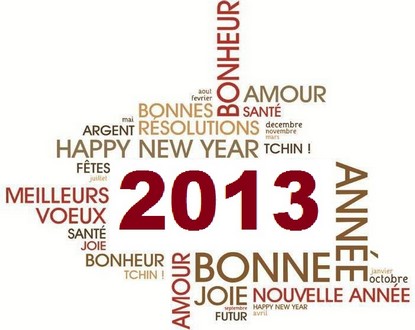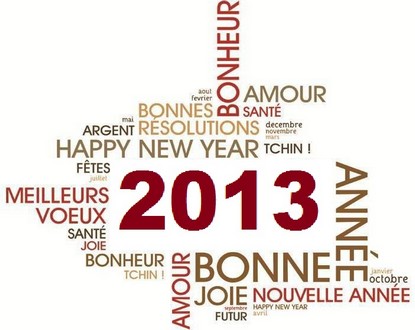The ceremony of wishes, in addition to respecting tradition and protocol, is also an opportunity to take stock of the year that has just passed and present hopes for the one that has just begun… while waiting for the next one!
 In 2013, Nice’s political life will not lack important appointments, particularly the implementation and preparation of the 2014 municipal elections, when Christian Estrosi’s term will end.
In 2013, Nice’s political life will not lack important appointments, particularly the implementation and preparation of the 2014 municipal elections, when Christian Estrosi’s term will end.
But if this new year will be free of national or local votes, for the Mayor and President of the Metropolis, who has just celebrated his first year, and for his ally Eric Ciotti, President of the General Council, there will be an aperitif: The new election of the UMP president which, after the contested edition of last autumn that ended in a real farce through appeals, will have to be conducted again, and this time in exemplary regularity conditions.
And, as should be remembered, here in Nice and the Alpes-Maritimes, of the fierce opposition between the two rival factions, the pro-Fillon clan of Eric Ciotti joined by Christian Estrosi and the pro-Copé faction of Michèle Tabarot and the “Niçois” Olivier Bettati with the consequences of a vote that made national headlines for the cheating and manipulations to the point that the results of two polling stations were canceled (a unique case). We can imagine that all attention will be focused on this decisive meeting whether it is for the internal balances of the party at the national and local level. With all that follows…
On the socialist side, in a department that history and sociology place on the right with a significant presence of the far-right, life isn’t easy. The protection of the national government can support some pointed situations (like the replacement of the former prefect considered too compliant with the Mayor of Nice), but nevertheless remains the state of an uncomfortable situation without a real perspective for change: At best, achieving a three-way race thanks to the presence of a strong FN candidate or a union list of right-wing parties and movements opposing UMP and especially the current Mayor of Nice.
In short, the games are not yet decided, the marbles are still rolling between tactics and personal ambitions…
The wishes of Christian Estrosi took place in an institutional setting, a grand evening at the Palais Nikaïa in the presence of authorities, municipal and metropolitan agents, and various ancillary services.
Thousands of people ensured the effect of a critical mass. The Grand Mass, indeed.
A somewhat theatrical evening quickly transformed into a “One man show” by Christian Estrosi, known for a modesty that is not his most obvious quality. The entrance was a parade with elected officials and collaborators followed by a few guests of honor (the OGCN staff with its president, its sports manager, and captain, and Olympic swimming champions Camille Muffat and Yannick Angel). An introduction slightly overly laudatory by Prefect Anne Boquet (what a surprise to discover a beautiful reciting voice!) followed by a verbal marathon by the Mayor in “condottiere” style made spectacular thanks to modern communication technologies like the teleprompter. In short, all the ingredients of a good scenario were united.
“The city is moving and, between innovative infrastructures and proximity interventions, more than 4500 construction projects have been opened since the beginning of the mandate.” declared Christian Estrosi, with images and figures to support it.
In 2013, the major projects will be the Médiathèque of the Gare du Sud which will add another piece to the renewal of the Libération district while awaiting the realization of the Gare Thiers project, the Sulzer car park and Quai de la Douane (more than 1000 parking spaces to help alleviate the lack of parking spots) and the two “Triple A” gems which will be the Grand-Stade Allianz Riviera and the Coulée Verte.
There, in a risky “crescendo”, Christian Estrosi, who got caught up in the game with enthusiasm certainly due to the pride of the filmmaker, ventured into sometimes misplaced comparisons by defining the first (Grand Stade Allianz Riviera) as the Niçois Coliseum and the other (Coulée Verte), like New York’s Central Park or even London’s Hyde Park or the Champ de Mars in Paris.
It is known that Christian Estrosi’s style leans toward “star power” but here, honestly, we are no longer there: The Grand Stade Allianz Riviera will be a very beautiful sports venue but can we reasonably imagine that in more than two thousand years, the Niçois of that time will be able to discover and admire the stadium as visitors still admire the Colosseum for its design (between 50,000 and 70,000 people could attend shows with an organization and seating distribution that is still functional today), its frescoes, its decorations, its inscriptions or its colors and their combinations?
And what to say of this Coulée Verte, a top-notch realization indeed, which will provide a more than pleasant living environment in a central area of the city (who could ever miss the surface parking and bus station that occupied the spot?). But, even for the 24 hectares of the Champ de Mars, how can one reasonably compare its surface to the 142 hectares of Hyde Park and especially the 341 hectares of Central Park?
Being romantic is useful for giving the audience the joy of imagination but here, we fall into a repetition of the extraordinary tales of the baron of Münchhausen whose epic and whimsical tone departs so much from reality.
Nice is a beautiful signature that doesn’t need the epic and whimsical that distances it from reality to head toward unlikely dreams.
With a more sober style, but style and character oppose them, socialist leader Patrick Allemand gathered militants and supporters in a more modest and convivial setting.
Naturally, how to forget, for the socialists, this exceptional vintage 2012 with the double victory in the presidential and legislative elections? After, respectively, 17 years and 10 years of abstinence, the desire was so strong, which perhaps obscured the difficulties in meeting their electorate’s expectations more than the opposing actions. And this, in an economic gloom context which doesn’t help alleviate the difficulties.
But to remain in local politics, one must not forget the right’s grip which, given its deviations, it’s difficult to call “republican”, without considering the frontist-marinist one that is well integrated in the South-East and of which Nice and its region are one of the strongholds.
So, being in command is good as department leader Patrick Allemand claims in his speech to his people. But apart from this legitimate pride, what else if not one defeat after the other in all electoral consultations ( must we recall the right’s sweep in the legislative elections despite a favorable wave to the left at the national level?).
What else if not occasional opposition but no more in the municipal councils of almost all communes in the Alpes-Maritimes and, of course, at the metropolitan and departmental council?
The situation is not easy, it is known that intentions are good but it is facts that count. Thus, the change that the President of the Republic and the government do not find application nor follow-up in the Alpes-Maritimes where power relations are not favorable and the fiefdoms managing their territory are not about to be dethroned.
Patrick Allemand himself acknowledges: “Here the change is more difficult. There is strong resistance from Christian Estrosi and Eric Ciotti.”
The beautiful revelation…
Moreover, this feeling that the PACA Region, predominantly Marseillais, opposes any Niçois project is very widespread at the popular level (and certainly fueled by those who have an interest in exploiting it politically), adding confusion to the mire.
To this accusation, Patrick Allemand responds vigorously: “The Region has always supported territorial projects of general interest: for example, the regional rail transport has been significantly improved in the Azur area. Co-financing intervened for the Leonardo da Vinci Library in l’Ariane as well as for the Médiathèque of the Gare du Sud. Even for the stadium’s financing, although the project was imposed, the Region intervened with a not at all marginal contribution.
Must I recall that the most costly operation is that regarding the Eucalyptus High School which will cost 45 million euros?
The truth is that Mr. Estrosi has a very peculiar definition of collaboration: I decide and you pay. Otherwise, he cries conspiracy against Nice. But since the song is always the same, now we know the refrain!”
The conclusion to the good people of the rose is faultlessly linear: In 2013, we will launch a political battle to have the government’s reforms applied here as best as possible. And thereby, we will fault the local right and play all our cards for the municipal elections.
Finally, more criticism for Christian Estrosi: ‘The city lacks mobility and the stadium was prioritized over investment in the tramway’s line 2 which should have been the priority.’
And adding with a wink: “The Mayor of Nice always favors appearances over necessity.”
Almost a campaign slogan!


